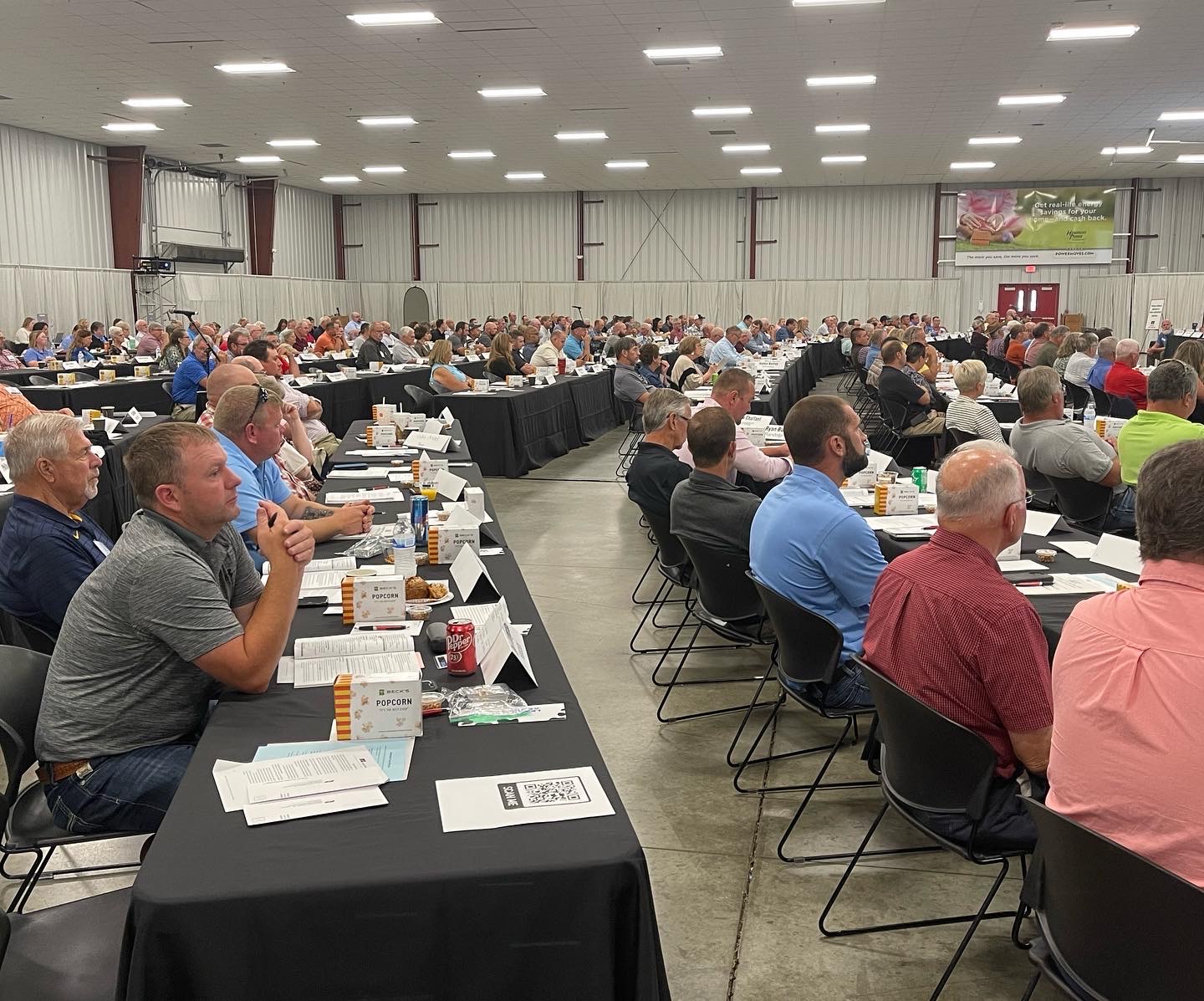Aug 29, 2022, 13:04 PM
by
Heidi Gant, INFB Marketing Team
Indiana Farm Bureau member delegates gathered at the Hendricks County Fairgrounds on Saturday, Aug. 27 to determine the policy positions of the organization for 2023.
Contact:
Heidi Gant
317-692-7828
317-966-3719
hgant@infb.org
(Indianapolis) – Aug. 29, 2022 – Indiana Farm Bureau member delegates gathered at the Hendricks County Fairgrounds on Saturday, Aug. 27 to determine the policy positions of the organization for 2023.
The delegate body consisted of 234 farmers and agribusiness professionals from across the state. The members discussed several issues including broadband access, renewable energy, grain indemnity and more.
“Our members worked very hard to craft policy positions for issues that impact agriculture,” said Randy Kron, INFB president. “INFB also has worked hard to streamline our policy process from the county submissions to the work of our resolutions committee, and that was evident in this year’s meeting.”
INFB’s policy development process begins at the local level. Each year, all counties can make policy suggestions or edits. Then, those suggestions are debated by a resolutions committee before being brought to the full delegate session. The grassroots structure is vital to ensuring that INFB members can voice their opinions.
“It’s important that each member has an opportunity to be heard,” Kron said. “When you look at what’s going on in the agriculture community, our members are facing a number of issues that impact their bottom line from high input prices to supply chain issues to the weather experienced this spring and summer. Having clear policy positions in place gives our organization direction when we advocate for solutions to these concerns and others.”
In response to grain failures over the past couple of years, delegates supported additions to the policy book that call for more transparency and integrity of the Grain Buyers Warehouse Licensing Agency.
“There’s been a lot of work in the General Assembly addressing grain indemnity,” said Kendell Culp, INFB vice president. “But sometimes the state knows about the financial position of a grain warehouse and has had some issues with how quickly it’s dealt with. We put language in that helps the producers have more confidence in that grain-buying warehouse or elevator. This way they don’t wait to find a closed sign on the door to find out that grain isn’t going to be paid.”
Delegates also adopted language that would help expand broadband access in all parts of the state so rural members can take advantage of having the same internet speeds as those in urban areas. Other positions supported by delegates included rulemaking on fertilizer storage, net metering rates for renewable energy sources, and a continued focus on carbon sequestration.
During the session, delegates also voted on members who would represent INFB at the 2023 American Farm Bureau Federation Convention. The AFBF Convention will be held in San Juan, Puerto Rico in January. The INFB delegates chosen will discuss policy positions for the national organization with representatives from all 50 states and Puerto Rico. Four county Farm Bureau presidents were elected as delegates for the AFBF Convention:
- Alayne Johnson, Whitley County
- Scott Walker, Jasper County
- George Kakasuleff, Hamilton County
- Elaine Dragstrem, Miami County
Over the next few weeks, the INFB board of directors will determine the priorities for the 2023 state legislative session. Federal priorities are set at the AFBF level based on input from all state Farm Bureaus. Now, the INFB public policy team will work with regional managers, district directors and county Farm Bureau members to decide which priorities will set the stage for the organization’s efforts at the Statehouse and in Washington, D.C.
###
About Indiana Farm Bureau: For more than 100 years, Indiana Farm Bureau (INFB) has promoted agriculture in Indiana through public education, member engagement, and by advocating for agricultural and rural needs. As the state’s largest general farm organization, INFB works diligently to ensure a farmer’s right to farm—protecting the livelihood, land, equipment, animals and crops of Hoosier farmers—because agriculture is vital to Indiana’s economy. Learn more at INFB.org




-(002)35f7d04bd5406b3696e3ff0000f5c395.png?sfvrsn=18b7bbe8_1)








Collegiate Farm Bureau at Purdue
Collegiate Farm Bureau at Vincennes
Collegiate Farm Bureau at Huntington
@FarmBureau
@AITCTweets